Anxiety is a normal response to dealing with COVID-19, especially amongst children. Parents need to pay extra attention in order to identify if their child suffers from anxiety, this will help in responding sooner rather than later.
Some signs of anxiety are evident.
Simply being aware of signs of anxiety can help the condition to be managed. Early signs can be different in all children. We advise parents to observe their children to see if their child/ren battle to complete simple daily tasks or if they may be disengaged in hobbies that they previously enjoyed. Another sign includes trouble sleeping, which ultimately impacts a child’s energy levels and appetite. Other signs may include nail-biting, being restless, exhibiting signs of a short temper and continuous worrying.
Demonstration of anxiety
Signs of anxiety can be demonstrated in various ways depending on a child’s age. Younger children who struggle to express their feelings may have an outburst or demonstrate aggressive behavior, making it difficult for a parent to understand what the problem might be.
With teenagers and older children, they may appear irritable and choose to be alone when they begin to feel anxious. It is important for parents to communicate all of these signs to their children and to provide their children with ways of trying to manage their feelings and actions accordingly.
How to manage the anxiety?
Teaching coping skills to manage anxiety is helpful to children. The most effective way to manage anxiety is to use physical strategies such as breathing deeply, counting backward from 100, finding a safe area in the house to unwind, giving the child their favorite or comfort toy is also helpful in getting them to be calm and relaxed. Certain physical activities such as painting art or reading books, or playing a game can help children lower their anxiety and give parents an opportunity to talk to them about how they feel.
Parents need to make children aware from an early age that it is important to focus on what they can control instead of what they cannot control. Make your children aware that they should focus on what they can do now to help them deal with their anxiety. With regards to anxiety directly related to the Covid-19 pandemic, go over social distancing rules on hand sanitization and the use of personal protective equipment such as face masks. These conversations can help children feel more comfortable about being in public spaces knowing that they are safe.
Lastly, make an effort to ask your child what they are thinking about and discuss whether it is based on fact or fiction. If your child has fictional thoughts that they have created in their mind, you and your child can talk about it to find ways to change the focus to what is actually happening now in reality and encouraging them to have positive thoughts and a positive outlook on life.
However, professional help should be sought if it starts to affect your child’s ability to think and function in their daily lives at home, at school, and in their social environment.
Source: Children’s Health; Kids Helpline

